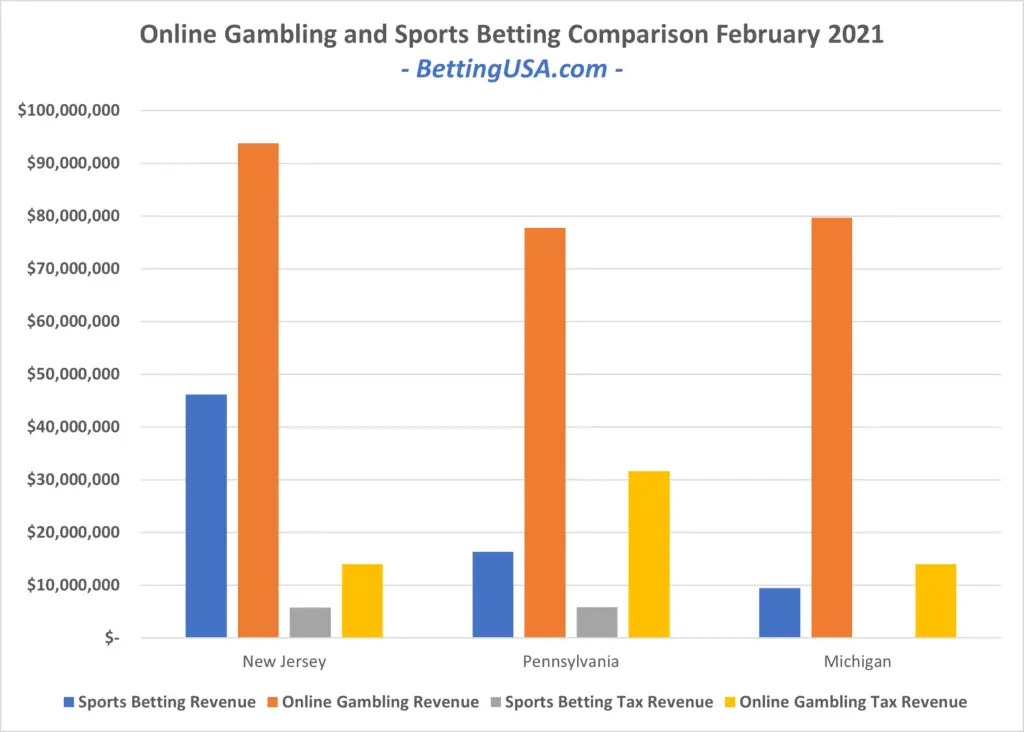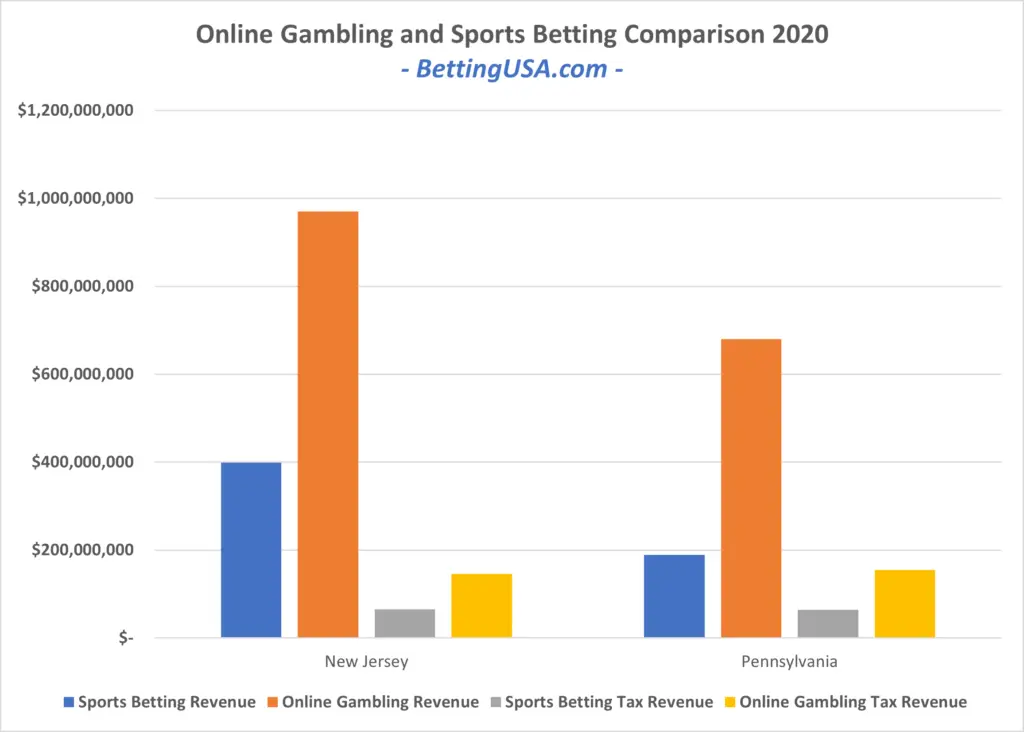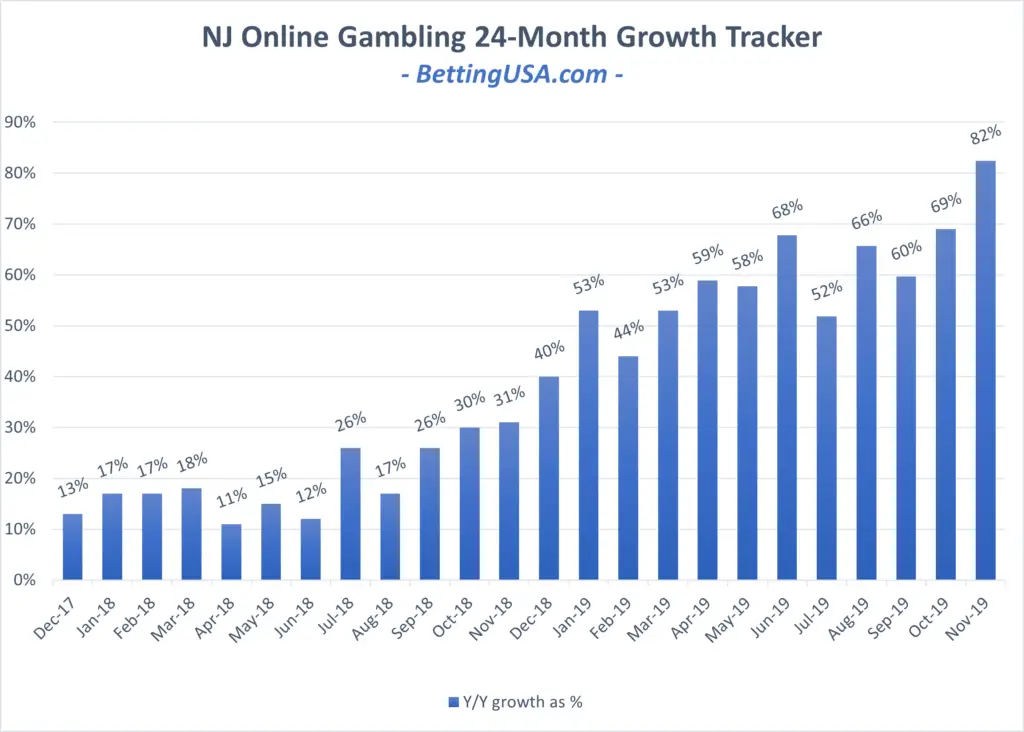Message To Lawmakers: Online Casino Revenue Outperforms Sports Betting

It’s time for lawmakers to open their eyes. For whatever reason, states continue to tout legal sports betting as the best way to generate new gambling revenue, even though every shred of evidence points to legal online casinos as the real opportunity.
Here’s the latest from the top three markets that offer both online casino games and sports betting.
Two notes about the following charts:
- Sports betting lumps retail and online sports betting together.
- Online gambling combines online casino and online poker.

For those interested in a more historical view, here is the same chart for the entirety of 2020:

Sports betting provides states with much-needed revenue to New Jersey and Pennsylvania, but the above charts crystallize that online casino (with a small assist from online poker) is where the actual revenue opportunities are.
So why then is sports betting sucking up all the oxygen in the room?
Sports Betting Isn’t Different
The consensus is sports betting is an easier sell to lawmakers and residents. Essentially, sports betting is seen as the most palatable gambling expansion on the table.
The nonstop headlines and legalization campaigns since the Supreme Court overturned the Professional and Amateur Sports Protection Act (PASPA) has sports betting levitating above other forms of gambling and somehow seen as less harmful.
But that shouldn’t be the case.
As the National Council on Problem Gambling (NCPG) and other problem gambling advocates have noted many times, sports betting is one of the most addictive forms of gambling.
According to 2020 testimony submitted to the Wyoming legislature by the NCPG:
- The rate of gambling problems among sports bettors is at least twice as high as among gamblers in general.
- When sports gambling is conducted online, the rate of problems is even higher, with one study of online sports gamblers indicating that 16% met clinical criteria for gambling disorder and another 13% showed some signs of gambling problems.
Why Not Legalize Both?
The big question is, why are most states settling on a single expansion? It’s like legalizing beer but not wine.
Ask any industry insider about the synergies between online casino, poker, and sports betting, and you’ll receive the same answer over and over: the products are complementary. Having one but not the other is as self-limiting as some of the condemned policies of in-person registration, monopolies, and excessive operator burdens.
Notice the acceleration of growth at New Jersey online casino sites growth following the introduction of online sports betting in August 2018.

The Elephant in the Room
Few states are giving adequate airtime to problem gambling funding.
The simplest way for lawmakers to quell concerns about expanded gambling is to put the necessary infrastructure in place to minimize the harm. Fully funding research and treatment is the starting point, and any state that is derelict on these fronts is robbing Peter to pay Paul. Meaning, they’re adding revenue from gambling, but without harm mitigation, many gains are erased by the state footing the bill on everything from bankruptcies to healthcare costs.
These costs are hard to track and rarely are associated with gaming revenues. But as EPIC Risk Management’s Brianne Doura-Schawohl told Gaming Law Review, “Back in 1999, there was that national survey that was done under the Clinton administration that examined the social cost of gambling addiction. That was about one percent of the population. It came up with a number. When we look at it with inflation to today, it is roughly about $1,200 per person.”
In a state like Massachusetts, that works out to about $84 million. In New York, it would be $240 million. If a state doesn’t expressly earmark funds for these programs (which can radically reduce the total cost through preventative policies), this amount should be considered an added cost to the state.







